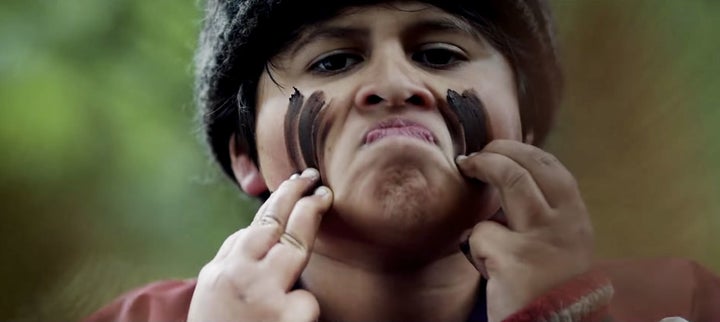An elderly woman climbed the stairs looking for her friend, who was waving at her in the row in front of us. Upon seeing said friend, the woman decided not to walk down the right row, but take a detour through ours.
In the last act, during a particularly quiet scene, a man with the lung capacity of Mickey Mouse was the lone squeaker of "Damn!", much to the crowd's amusement.
Long story short, this movie sucks: a placeholder in Hollywood's BYE week between summer blockbusters and fall award-winners. Morgan cobbles together elements of Ex Machina, The Terminator, and Transcendence and waters it down to an unsalted broth.
For the most part, Morgan acts like a regular girl. Flashbacks show her frolicking through the woods with her "family," the scientists who've spent six years in the research enclosure overseeing her development. One scientist, Amy (Rose Leslie), is Morgan's best friend, promising her a trip to the lake to see its unfathomable beauty, an event that captures Morgan's blossoming imagination.
Whenever Morgan snaps, we aren't given much information as to why. Is it an error in her wiring? Is it a product of rapid growth: her body is 18 but her emotions are five? These suggestions aren't the movie's, by the way.
What the movie prefers to spend time on is with the scientists, whose characters are shallow at best and annoying at worst. Most of their dialogue consists of praising Morgan blindly; she's such a special girl, they say.
They're not totally wrong. Morgan has the uncanny ability to know everything one can google about a person as soon as she sees them, as well as exhibiting bouts of telekinesis. I don't know how adding nanotechnology to a fetus gives a person psychic powers, but it's okay. I don't think the movie knows either.
I must ask, however, in a movie about AI that features violent outbursts and pseudo-intellectual debates about consciousness, why the writer (Seth W. Owen) feels the need to introduce a subplot where Skip the cook (Boyd Holbrook) goes for a meet-cute with Lee. It has the romantic fire of a middle school kid trying to sit next to their crush at the lunch table.
Most of the acting is bland because the dialogue is hollow, save for a hammy role by Paul Giamatti, who was gracious enough to relieve my boredom for 10 minutes. It seems Kate Mara is trying to pull off an icy intimidation, but it looks and sounds like Vince Vaughn in The Lost World. The movie tries to explain her no-nonsense personality, but the explanation is so dumb and predictable that it feels like a studio note.
Morgan lacks the soul, intelligence, and flavor of a sci-fi thriller. I'd say "Avoid it," but given its opening weekend grossed a whopping $1.9 million, putting the movie in 17th place, it seems like you lot already have. Keep up the good work.
Thank you all for reading. I'm the Man Without a Plan, signing off.













